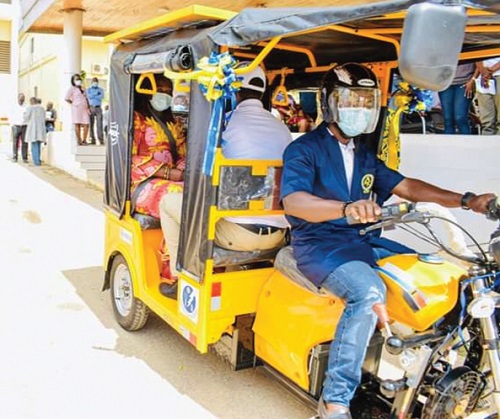
CCTU unveils solar ‘pragya’
The Engineering Design and Innovation Centre (EDIC) of the Cape Coast Technical University with support from the Energy Commission has produced solar tricycles referred to locally as ‘pragya’.
The noiseless solar tricycles which are now released for use across the university's campus use solar panels instead of the conventional fuel.
Advertisement
To further make the tricycles safer, the centre has fixed seat belts on the tricycles.
Need
The use of the tricycles has become a critical part of the transportation system in Cape Coast, with hundreds of commuters in the metropolis opting for that mode of transport every day.
However, as a growing cheaper means of transportation, patronage and use of the tricycles has received some intense and unfavourable criticisms from several quarters about the irresponsible riding of the tricycles, especially by underage riders, which had increased accidents involving the tricycles.
This compelled the Cape Coast Metropolitan Assembly to ban all underage riders, limiting tricycle driving to persons 25 years and above.
Another problem with the tricycles was the fact that they were unsafe and users were worried.
A user, Ms Hawa Yusif, said there were no safety belts and minor crashes led to severe injuries.
Again, as the number of the tricycles was increasing it was obvious that emissions were increasing, worsening the clean air of the tourist city of Cape Coast.
Ecobus
The university's EDIC with support from the Energy Commission is also working on an Ecobus project that would help them build an eco-friendly solar bus to be unveiled next year.
The Ecobus would also serve as an electricity-generating system when lights go out.
The Director of the EDIC, Dr Kwame Anane-Fenin, said the development was in line with the university's vision to be a leading innovative and entrepreneurial university recognised globally for its high-quality education research innovation and a reputation in green and clean energy technology.
The EDIC, under the Mechanical Engineering Department of the university, was set up to create, utilise and transform innovative ideas into usable products, with a focus on the application of renewable energy with high business advantage.
Dr Anane-Fenin said from studies it was realised that innovations by universities that was linked with industry was almost non-existent, adding that the centre and the university were committed to bridging that gap.
90 per cent users
He said considering the role of the Pragya in the socio-economic environment the centre decided to explore the vehicle, optimising its positives and minimising its negatives with support from the Energy Commission.
The centre, he said, was contacted by the Energy Commission to explore the possibility of reengineering the tricycles into solar and noiseless vehicles.
Dr Anane-Fenin said indeed a study conducted by EDIC further indicated that 90 per cent of vehicle users were ready to use solar tricycles.
He said the main part of the tricycle that often got spoilt and had to be repaired was the clutch and stated that the effort by EDIC also eliminated the use of the clutch.
He added that the technology would hopefully be used to develop electric scooters to totally adopt an eco-friendly transportation system to be used by students on the CCTU campus and extended to the metropolis.
Other innovations
The centre produced the automatic handwashing machine in 2019 in response to the COVID-19 pandemic, while in 2020, it designed the noiseless food trolley for the Cape Coast Teaching Hospital.
The centre also built a briquette making plant for Furnart Ghana, a furniture company, which was unveiled in 2021.
Dr Anane-Fenin further indicated that the university and EDIC hoped to work to support the conversion of tricycles in the region and the country into solar tricycles, which he indicated would accelerate efforts towards green and clean energy.
He said in the near future the centre would also develop bamboo bicycles and that the university's niche area was renewable energy development.
He, therefore, called on interested investors and partners to collaborate with the centre to make Cape Coast and the Central Region the preferred tourism destination with eco-friendly transportation.
Renewable energy innovations
The Vice-Chancellor of the University, Prof. Joshua Owusu-Sekyere, in his remarks, indicated that the university would continue to seek ways of optimising renewable energy innovations, particularly the automobile sector, in its quest to maintain its acclaim as the nation's clean automobile hub.
He indicated that the university had the human and technological manpower to support the One-District, One Factory project in the region particularly emphasising on renewable energy and called for investments from industry and collaborations.
The Central Region Minister, Mrs Justina Marigold Assan, said the initiatives were in line with the Regional Coordinating Council's commitment towards achieving the region's transformation agenda and pledged its commitment towards them.
She stated that the region, which remained the tourism hub of the country, must lead in efforts to go green and clean to promote tourism and a sustainable environment.
The Representative from the Energy Commission, Mr Fred Appiah, for his part, said the commission was committed to achieving the Sustaining Development Goal (SDG) seven, nine, 11 and 13 relating to clean energy development, especially urban transportation.




